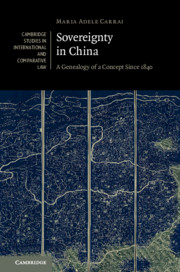Book contents
- Sovereignty in China
- Cambridge Studies in International and Comparative Law: 141
- Sovereignty in China
- Copyright page
- Dedication
- Contents
- Figures
- Acknowledgments
- Introduction
- 1 International Law and the Sinocentric Ritual System
- 2 Secularizing a Sacred Empire
- 3 China’s Struggle for Survival and the New Darwinist Conception of International Society (1895–1911)
- 4 China Rejoining the World and Its Fictional Sovereignty, 1912–1949
- 5 From Proletarian Revolution to Peaceful Coexistence
- 6 Historical Legacies, Globalization, and Chinese Sovereignty since 1989
- Conclusion
- Bibliography
- Index
- Cambridge Studies in International and Comparative Law
4 - China Rejoining the World and Its Fictional Sovereignty, 1912–1949
Published online by Cambridge University Press: 26 July 2019
- Sovereignty in China
- Cambridge Studies in International and Comparative Law: 141
- Sovereignty in China
- Copyright page
- Dedication
- Contents
- Figures
- Acknowledgments
- Introduction
- 1 International Law and the Sinocentric Ritual System
- 2 Secularizing a Sacred Empire
- 3 China’s Struggle for Survival and the New Darwinist Conception of International Society (1895–1911)
- 4 China Rejoining the World and Its Fictional Sovereignty, 1912–1949
- 5 From Proletarian Revolution to Peaceful Coexistence
- 6 Historical Legacies, Globalization, and Chinese Sovereignty since 1989
- Conclusion
- Bibliography
- Index
- Cambridge Studies in International and Comparative Law
Summary
As Wellington Koo, one of the great diplomats of the republican period, emphatically stated, after the Wuchang uprising of 1911 and the revolution that overthrew China’s last dynasty, the sacred source of imperial authority was replaced by the new people of the emerging Chinese nation. Despite a final failed attempt by Yuan Shikai to restore the imperial order in 1916, China was no longer considered by its ruling elite as a central sacral empire with an imperium that expanded potentially universally. It was now one nation among many, whose relations with other countries were no longer articulated through the tribute system or ritual justice but by the rules of international law and a fully fledged Ministry of Foreign Affairs. This period has often been seen as one during which China disintegrated until Mao Zedong’s rule, under which it was reunified.
- Type
- Chapter
- Information
- Sovereignty in ChinaA Genealogy of a Concept since 1840, pp. 109 - 151Publisher: Cambridge University PressPrint publication year: 2019



